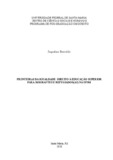| dc.creator | Bertoldo, Jaqueline | |
| dc.date.accessioned | 2021-05-13T18:16:00Z | |
| dc.date.available | 2021-05-13T18:16:00Z | |
| dc.date.issued | 2020-01-17 | |
| dc.identifier.uri | http://repositorio.ufsm.br/handle/1/20892 | |
| dc.description.abstract | Faced with the numerous barriers to access to human rights by the immigrant and refugee
population in Brazil, in 2016, UFSM approved the Program for Access to Technical and
Higher Education for Refugees and Immigrants in vulnerable situations, an initiative of the
Project of Teaching, Research and Extension Human Rights and Human Mobility
International and Chair Sérgio Vieira de Mello (Migraidh/CSVM). With the program, the
UFSM began to make possible the entry into technical, technical and undergraduate courses
for refugees and immigrants in vulnerable situations. Thus, the motivation of this research is
the possibility of following the trajectories and experiences of incoming immigrants and
refugees, their main difficulties and challenges since their arrival in Brazil and entry into the
institution's courses. As a problem that directs the study, we ask ourselves: based on the
experience of incoming students in the last two years (2017, 2018), what are the limits and
challenges of the Program of Access to Higher Education for immigrants in vulnerable
situations and refugees at UFSM for the promotion of diversity and equal opportunities in the
Brazilian context? Given the research problem presented, the general objective of the work is
to identify the limits and challenges in the social and legal field of the Program for Access to
Higher Education for refugees and immigrants in vulnerable situations at UFSM based on the
experience of incoming students in the last two years (2017, 2018). Through semi-structured
interviews with immigrant and refugee students of different nationalities and undergraduate
programs, we discussed the main frontiers of the right to higher education, such as
bureaucratic and documentary issues; work relationship and study opportunities; sociability at
university; intercultural relations and professional and return perspectives. | eng |
| dc.language | por | por |
| dc.publisher | Universidade Federal de Santa Maria | por |
| dc.rights | Attribution-NonCommercial-NoDerivatives 4.0 International | * |
| dc.rights.uri | http://creativecommons.org/licenses/by-nc-nd/4.0/ | * |
| dc.subject | Migrações internacionais | por |
| dc.subject | Refugiados | por |
| dc.subject | Direitos humanos | por |
| dc.subject | Ensino superior | por |
| dc.subject | Internacional migration | eng |
| dc.subject | Refugees | eng |
| dc.subject | Human rights | eng |
| dc.subject | Higher education | eng |
| dc.title | Fronteiras da igualdade: direito à educação superior para imigrantes e refugiados(as) na UFSM | por |
| dc.title.alternative | Borders of equality: right to higher education for immigrants and refugees at UFSM | eng |
| dc.type | Dissertação | por |
| dc.description.resumo | Diante das inúmeras barreiras para o acesso aos direitos humanos pela população imigrante e
refugiada no Brasil, no ano de 2016, a UFSM aprovou o Programa de Acesso à Educação
Técnica e Superior para Refugiados e Imigrantes em situação de vulnerabilidade, uma
iniciativa do Projeto de Ensino, Pesquisa e Extensão Direitos Humanos e Mobilidade Humana
Internacional e Cátedra Sérgio Vieira de Mello (Migraidh/CSVM). Com o programa, a UFSM
passou a viabilizar o ingresso nos cursos técnicos, tecnólogos e de graduação para
refugiados(as) e imigrantes em situação de vulnerabilidade. Assim, a motivação da presente
pesquisa está na possibilidade de acompanhar as trajetórias e vivências dos(as) ingressantes
imigrantes e refugiados(as), suas principais dificuldades e desafios desde a chegada no Brasil
e ingresso nos cursos da instituição. Como problemática que direciona o estudo, nos
questionamos: a partir da experiência dos(as) estudantes ingressantes nos últimos dois anos
(2017, 2018), quais os limites e desafios do Programa de Acesso à Educação superior para
imigrantes em situação de vulnerabilidade e refugiados da UFSM dentro de horizontes contra
hegemônicos para a promoção da diversidade e da igualdade de oportunidades no contexto
brasileiro? Diante do problema de pesquisa apresentado, o objetivo geral do trabalho consiste
em identificar os limites e desafios no campo social e jurídico do Programa de Acesso à
Educação Superior para refugiados(as) e imigrantes em situação de vulnerabilidade da UFSM
a partir da experiência dos(as) estudantes ingressantes nos últimos dois anos (2017, 2018).
Por meio de entrevistas semiestruturadas com estudantes imigrantes e refugiados(as) de
diferentes nacionalidades e cursos de graduação, discutimos sobre as principais fronteiras do
direito à educação superior, como as questões burocráticas e documentais; relação de trabalho
e oportunidades de estudo; sociabilidades na universidade; relações interculturais e
perspectivas profissionais e de retorno. | por |
| dc.contributor.advisor1 | Redin, Giuliana | |
| dc.contributor.advisor1Lattes | http://lattes.cnpq.br/2298217007407061 | por |
| dc.contributor.referee1 | Friedrich, Tatyana Scheila | |
| dc.contributor.referee1Lattes | XXXXXXXXXXXXXXX | por |
| dc.contributor.referee2 | Simões, Gustavo da Frota | |
| dc.contributor.referee2Lattes | XXXXXXXXXXXXXXXXXX | por |
| dc.creator.Lattes | http://lattes.cnpq.br/2356347983990844 | por |
| dc.publisher.country | Brasil | por |
| dc.publisher.department | Direito | por |
| dc.publisher.initials | UFSM | por |
| dc.publisher.program | Programa de Pós-Graduação em Direito | por |
| dc.subject.cnpq | CNPQ::CIENCIAS SOCIAIS APLICADAS::DIREITO | por |
| dc.publisher.unidade | Centro de Ciências Sociais e Humanas | por |



